Etre Conjugation (All 8 French Tenses)
Etre in French is one of the most frequently used verbs. The meaning of Être is “to be”.
This article gives you être conjugations in the most common indicative tenses of the French language, as well as some hints on how you would use them in everyday speech. This article will also help you to learn correct grammar so your speech and communication skills in French become top notch!
Why only the 8 indicative tenses? Because those are the tenses you’ll hear when practicing your French! There are 13 other tenses but they have more to do with mood and some intent. On top of that they’re rarely used, so even if you’re an intermediate or advanced French learner then the indicative 8 are ALL you need!
Before you continue: Corrector provides a free tool to help you correct grammar and spelling in any language (including conjugations)! Just click here to access it!
French Tenses for Etre Conjugation
- Présent. Something that is happening now. This can either be ongoing or instant. Eg: I am. / I’m being.
- Imparfait (imperfect). Used to describe ongoing, continual or habitual past events. Eg: I was being / I was.
- Passé simple is not common and normally found in formal or literary contexts. If you’re a beginner or even intermediate French learner then you can safely ignore it for now (but it’s still included below for convenience). Eg: I was.
- Passé composé. Widely used to talk about completed past actions. Eg: I was.
- Futur simple (simple future) is used when you intend to describe a general future state of being. Eg: I will be. Once again, beginners can generally ignore this conjugation as there’s a much simpler version (next in list) that will suffice for now.
- Futur proche (near future) describes an upcoming action. In English this would be “I am going to be …“. This should be your go to future tense when learning conjugations.
- Plus-que-parfait (pluperfect). This tense indicates that an action had taken place and was completed before another past action took place. Eg: I was there before you arrived.
- Passé antérieur is not common at all (just like passé simple), and again is found in formal or literary contexts. Eg: I had been.
- Futur antérieur (future perfect) is used to describe a future action that will be completed in the future before another action is started. For example: I will been there before you arrive.
Mastering être conjugation in at least 3 tenses (present, passé composé and futur proche is essential for becoming proficient in French. In fact I would concentrate on these 3 and only study the others when they come up in literature or other contexts.
The following tables also give usage examples of être verbs in French.
Être Présent Conjugation (Present)
| Pronoun | Conjugation | English Translation |
|---|---|---|
| Je | suis | I am |
| Tu | es | You are (singular) |
| Il/Elle | est | He/She is |
| Nous | sommes | We are |
| Vous | êtes | You are (plural) |
| Ils/Elles | sont | They are |
Présent (Present) Tense Usage: The Présent tense is used to describe actions or states that are happening at the current moment or are generally true. It is the most frequently used tense in all languages.
Example sentences:
- Je suis content. (I am happy.)
- Tu es étudiant. (You are a student.)
- Ils sont français. (They are French.)
Être Imparfait Conjugation (Imperfect)
| Pronoun | Conjugation | English Translation |
|---|---|---|
| Je | étais | I was |
| Tu | étais | You were (singular) |
| Il/Elle | était | He/She was |
| Nous | étions | We were |
| Vous | étiez | You were (plural) |
| Ils/Elles | étaient | They were |
Imparfait (Imperfect) Tense Usage: The Imparfait tense is used to describe ongoing or habitual actions from the past. It is commonly used to set the background for other actions in the past. In everyday French it is used to talk about past events or actions that were ongoing. Imparfait is also used to talk about feelings, attitudes, time & date and the weather.
Example sentences:
- J’étais fatigué hier soir. (I was tired last night.)
- Elle était toujours en retard. (She was always late.)
- Nous étions heureux ensemble. (We were happy together.)
Être Passé Simple Conjugation (Simple Past)
| Pronoun | Conjugation | English Translation |
|---|---|---|
| Je | fus | I was/were |
| Tu | fus | You were (singular) |
| Il/Elle | fut | He/She was |
| Nous | fûmes | We were |
| Vous | fûtes | You were (plural) |
| Ils/Elles | furent | They were |
Passé Simple (Simple Past) Tense Usage: The Passé Simple être conjugation is primarily used in written literature, especially within narrative texts such as novels, stories, and historical accounts. In everyday spoken language, the Passé Simple is rarely used but you will see it everywhere in the aforementioned literary works. In meaning there is virtually no difference between this tense and the Passé Composé.
Example sentences:
- Je fus surpris par la nouvelle. (I was surprised by the news.)
- Ils furent ravis de l’invitation. (They were delighted by the invitation.)
- Elle fut élue présidente. (She was elected president.)
Être Passé Composé Conjugation (Present Perfect)
| Pronoun | Conjugation | English Translation |
|---|---|---|
| J’ai | été | I have been |
| Tu as | été | You have been (singular) |
| Il/Elle a | été | He/She has been |
| Nous avons | été | We have been |
| Vous avez | été | You have been (plural) |
| Ils/Elles ont | été | They have been |
Passé Composé (Present Perfect) Tense Usage: The Passé Composé tense is used to talk about completed actions in the past. It is one of the most common past tenses and is frequently used in everyday French language.
Example sentences:
- J’ai été malade la semaine dernière. (I have been sick last week.)
- Ils ont été ensemble pendant des années. (They have been together for years.)
- Vous avez été formidables ! (You have been amazing!)
Être Futur Simple Conjugation (Simple Future)
| Pronoun | Conjugation | English Translation |
|---|---|---|
| Je | serai | I will be |
| Tu | seras | You will be (singular) |
| Il/Elle | sera | He/She will be |
| Nous | serons | We will be |
| Vous | serez | You will be (plural) |
| Ils/Elles | seront | They will be |
Futur Simple (Simple Future) Tense Usage: The futur simple être conjugation is used to express actions that will happen in the future. It is commonly used in everyday language when talking about general future plans or intentions.
Example sentences:
- Je serai là à l’heure convenue. (I will be there at the agreed time.)
- Vous serez surpris par le résultat. (You will be surprised by the result.)
- Ils seront ravis de vous revoir. (They will be delighted to see you again.)
Être Futur Proche Conjugation (Near Future)
NOTE: Futur proche is not an “official” tense in French. Rather it is an alternate way of expressing “Futur Simple”!
| Pronoun | Conjugation | English Translation |
|---|---|---|
| Je vais | être | I am going to be |
| Tu vas | être | You are going to be (singular) |
| Il/Elle va | être | He/She is going to be |
| Nous allons | être | We are going to be |
| Vous allez | être | You are going to be (plural) |
| Ils/Elles vont | être | They are going to be |
Futur Proche (Near Future) Tense Usage: This is also known as the “going to” future tense. It is used to express actions that are planned or about to happen in the near future. It is commonly used in everyday spoken French.
Example sentences for être conjugation:
- Je vais être occupé demain. (I am going to be busy tomorrow.)
- Nous allons être en retard si nous ne partons pas maintenant. (We are going to be late if we don’t leave now.)
- Ils vont être heureux de te voir. (They are going to be happy to see you.)
Être Plus-que-parfait Conjugation (Pluperfect)
| Pronoun | Conjugation | English Translation |
|---|---|---|
| J’avais | été | I had been |
| Tu avais | été | You had been (singular) |
| Il/Elle avait | été | He/She had been |
| Nous avions | été | We had been |
| Vous aviez | été | You had been (plural) |
| Ils/Elles avaient | été | They had been |
Plus-que-parfait (Pluperfect) Tense Usage: This tense is used to express actions that had happened before some other past action. It is commonly used in written language, especially in literature and formal texts.
Example sentences:
- J’avais été informé de la décision. (I had been informed of the decision.)
- Elle avait été malade avant la fête. (She had been sick before the party.)
- Ils avaient été prévenus de la réunion. (They had been informed about the meeting.)
Être Passé Antérieur Conjugation (Past Anterior)
| Pronoun | Conjugation | English Translation |
|---|---|---|
| J’eus | été | I had been |
| Tu eus | été | You had been (singular) |
| Il/Elle eut | été | He/She had been |
| Nous eûmes | été | We had been |
| Vous eûtes | été | You had been (plural) |
| Ils/Elles eurent | été | They had been |
Passé Antérieur (Past Anterior) Tense Usage: This tense is a literary tense used in formal and historical writing. It is similar in meaning to the Plus-que-parfait tense (Pluperfect) but is considered more archaic and is mostly found in classical literature. As a French speaker you will hardly ever (if at all) use this tense!
Example sentences for Passé Antérieur être conjugation:
- J’eu été surpris d’apprendre la nouvelle. (I had been surprised to hear the news.)
- Elle eut été enchantée de le rencontrer. (She had been delighted to meet him.)
- Ils eurent été ravis de la proposition. (They had been delighted with the proposal.)
Être Futur Antérieur Conjugation (Future Perfect)
| Pronoun | Conjugation | English Translation |
|---|---|---|
| J’aurai | été | I will have been |
| Tu auras | été | You will have been (singular) |
| Il/Elle aura | été | He/She will have been |
| Nous aurons | été | We will have been |
| Vous aurez | été | You will have been (plural) |
| Ils/Elles auront | été | They will have been |
Futur Antérieur (Future Perfect) Tense Usage: The Futur Antérieur tense is used to express actions that will have been completed before a specific future point in time. In fact that preceding sentence is an exact example of it, using the phrase “will have been”. It is used both in written and spoken language.
Example sentences:
- J’aurai été diplômé depuis un an. (I will have been graduated for a year.)
- Ils auront été mariés pendant dix ans. (They will have been married for ten years.)
- Nous aurons été amis depuis l’enfance. (We will have been friends since childhood.)
Wrap Up
Être conjugation isn’t too difficult to learn as long as you stick to present, futur proche and imparfait tenses. You can safely ignore the others for now (but do come back when you’re happily proficient in French).
If you’d like to read more about French verbs, conjugation and tenses then check out this article on how to master French verb conjugations. Lot’s of great tips in there if you’re struggling!
Alternatively let us do the hard work of analysing your French texts by using our free tool!
Être Conjugation Charts (FREE to Download)
To download a zip file of all the Être Conjugation Charts simply click this link. Alternatively click the charts below and save individual conjugations.
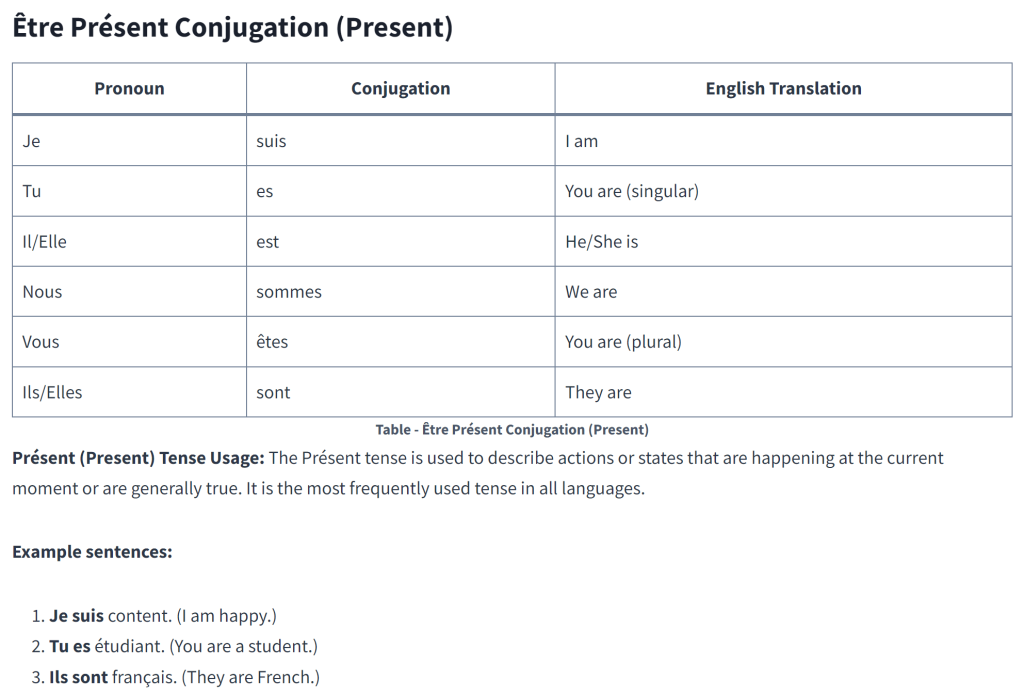
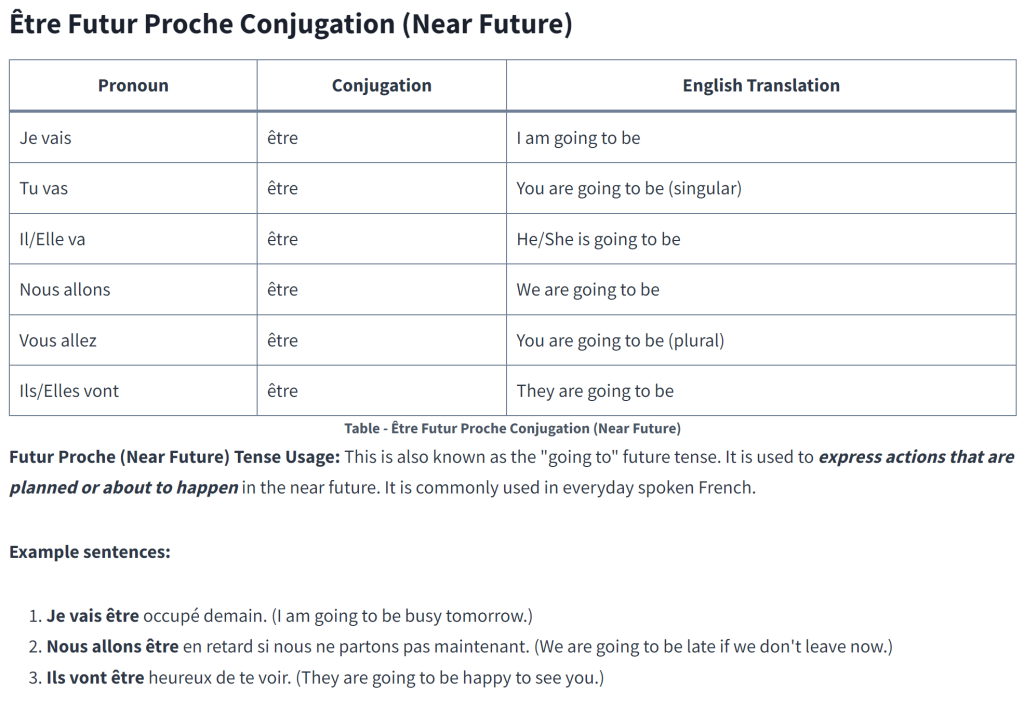
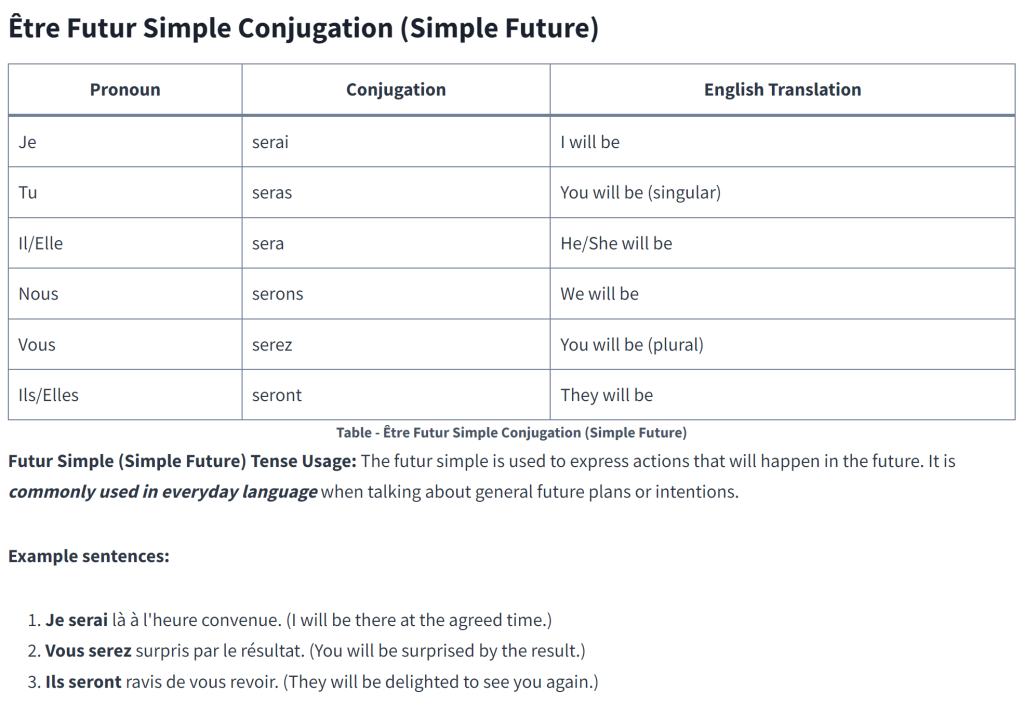
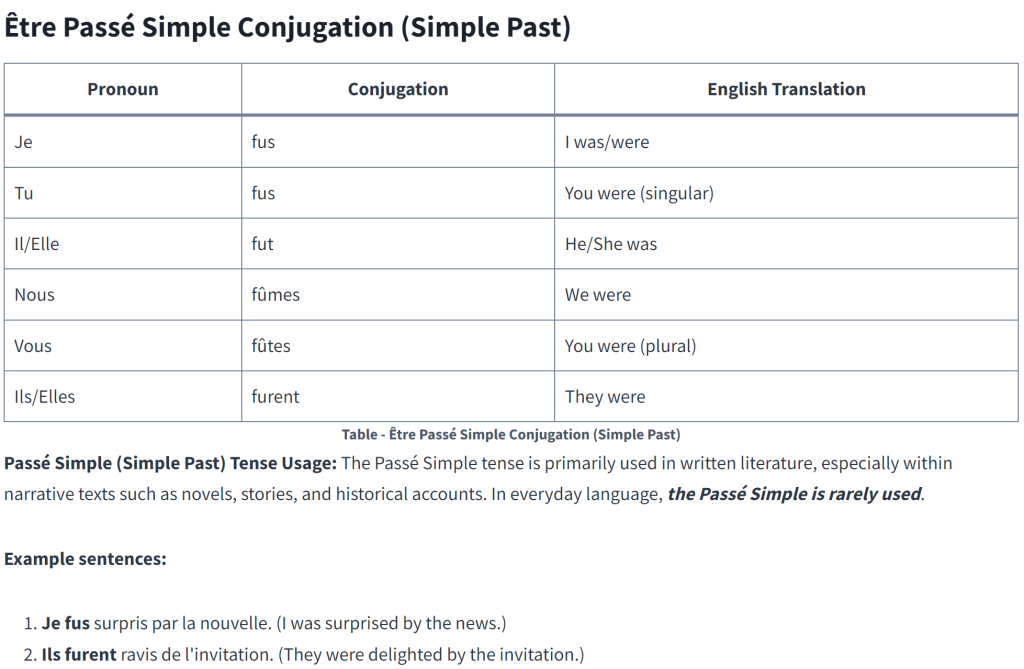
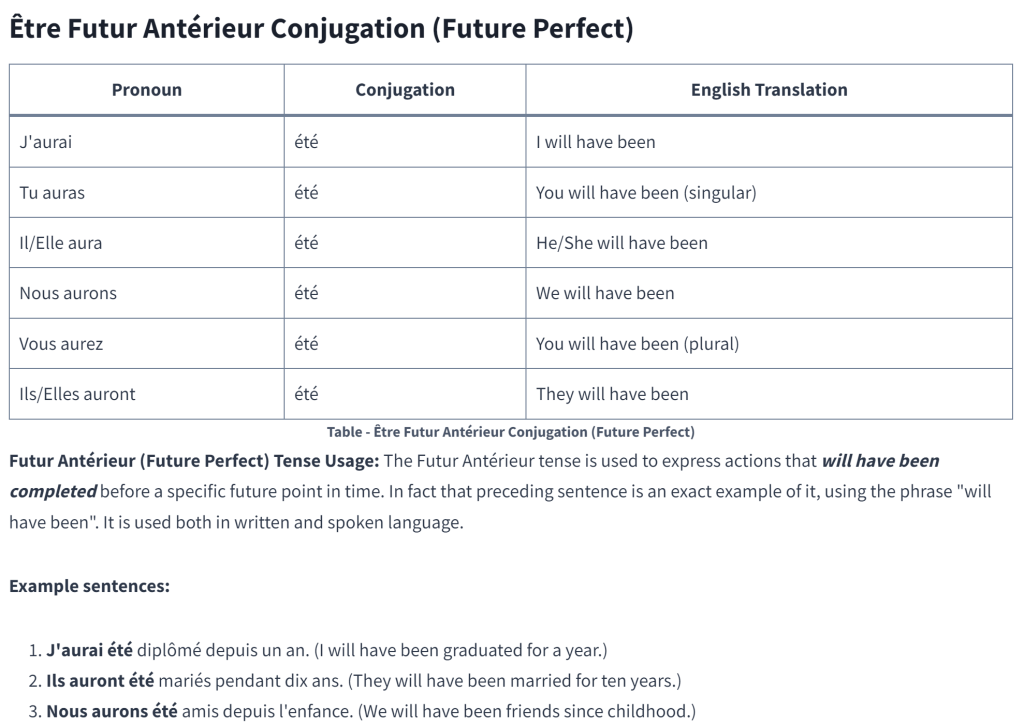
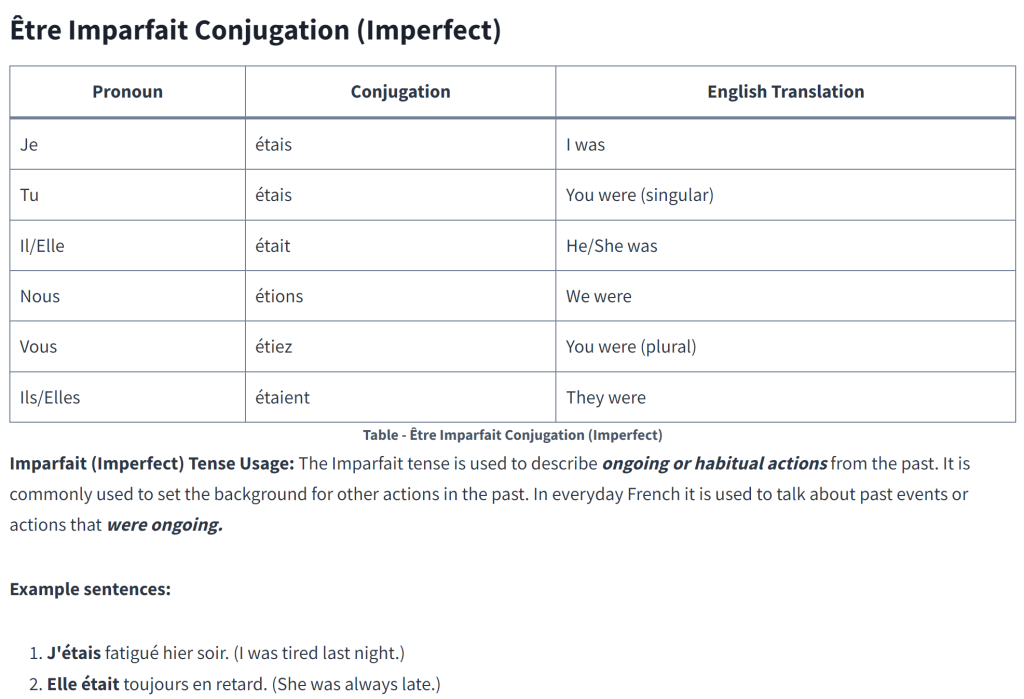
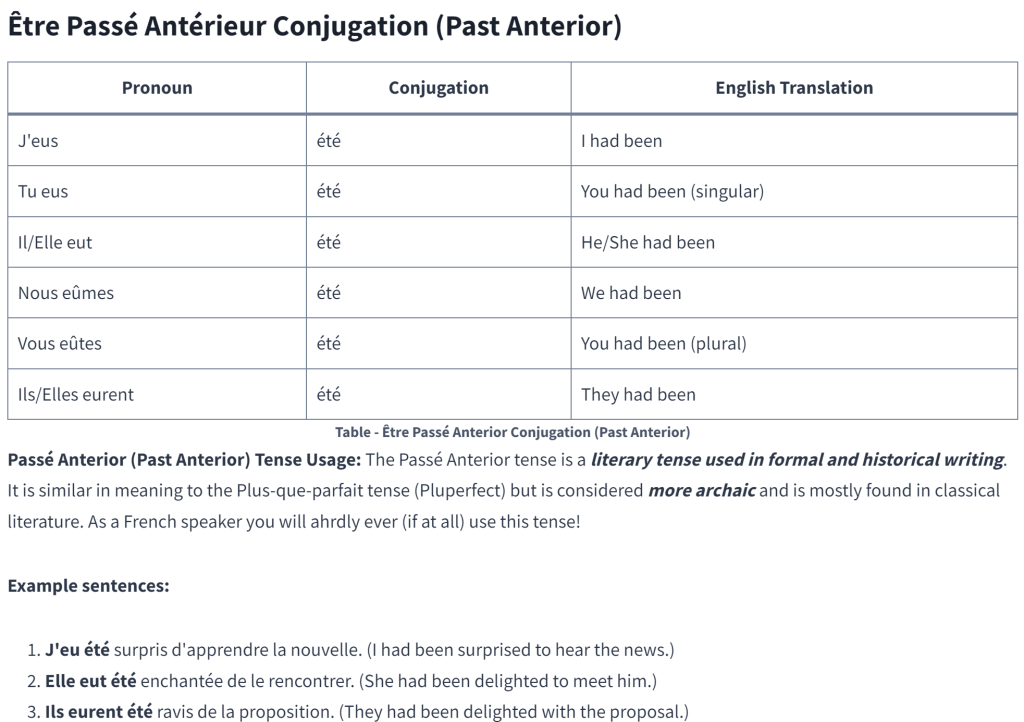
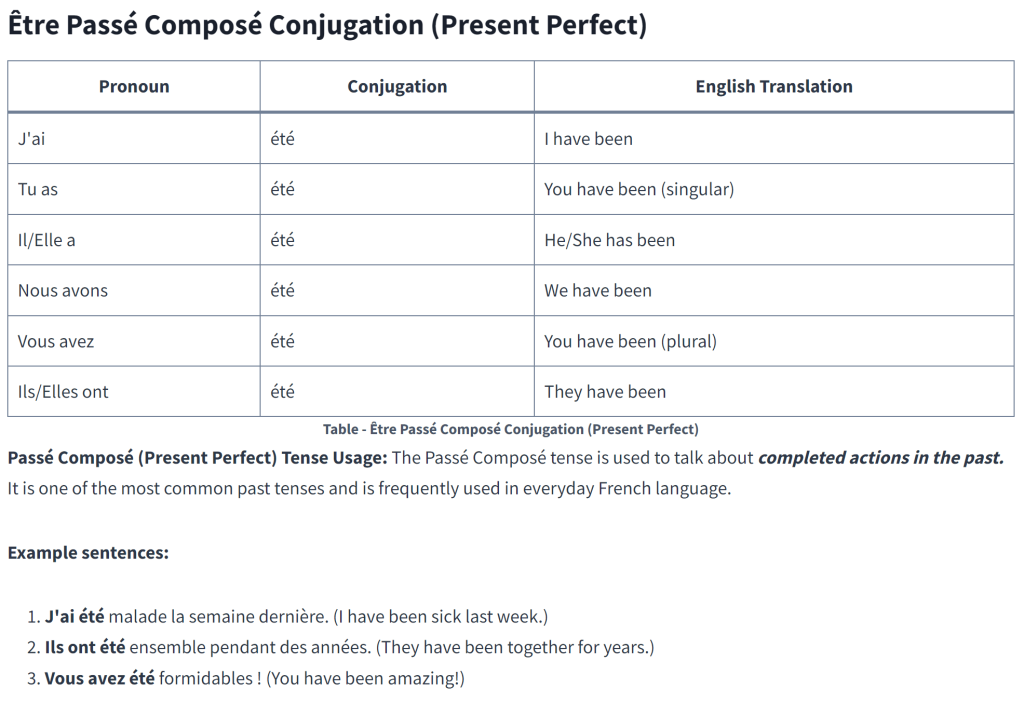
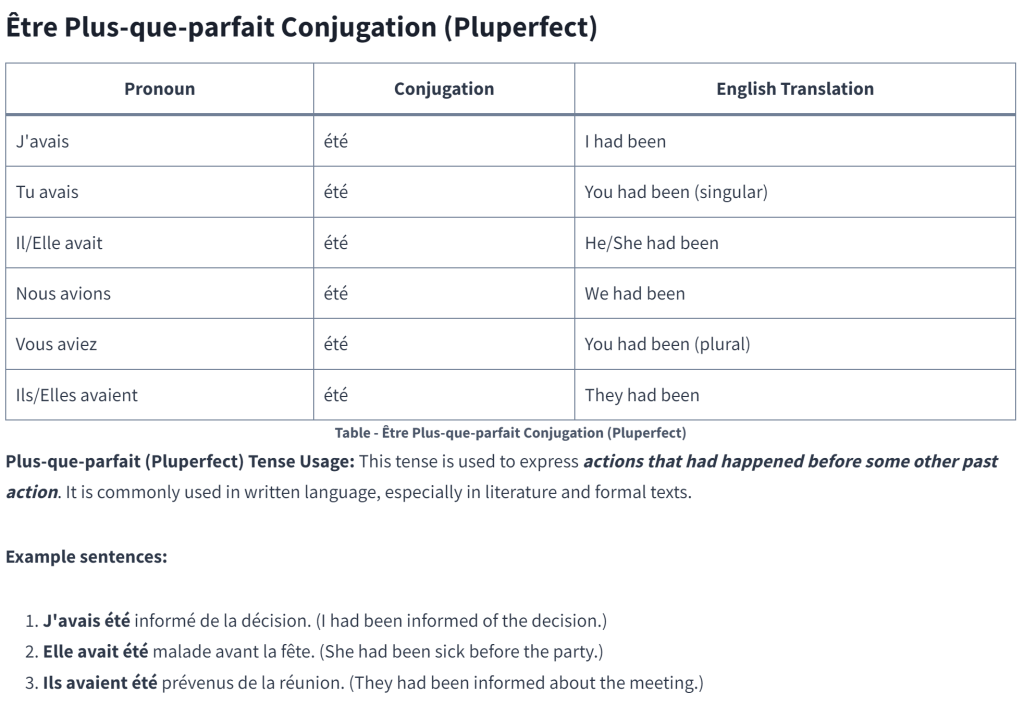
Other French Verb Conjugations You May be Interested In
We don’t only have être conjugations! Here are some others you may want to check out! Also, check out this link which tells you the history of the word.
